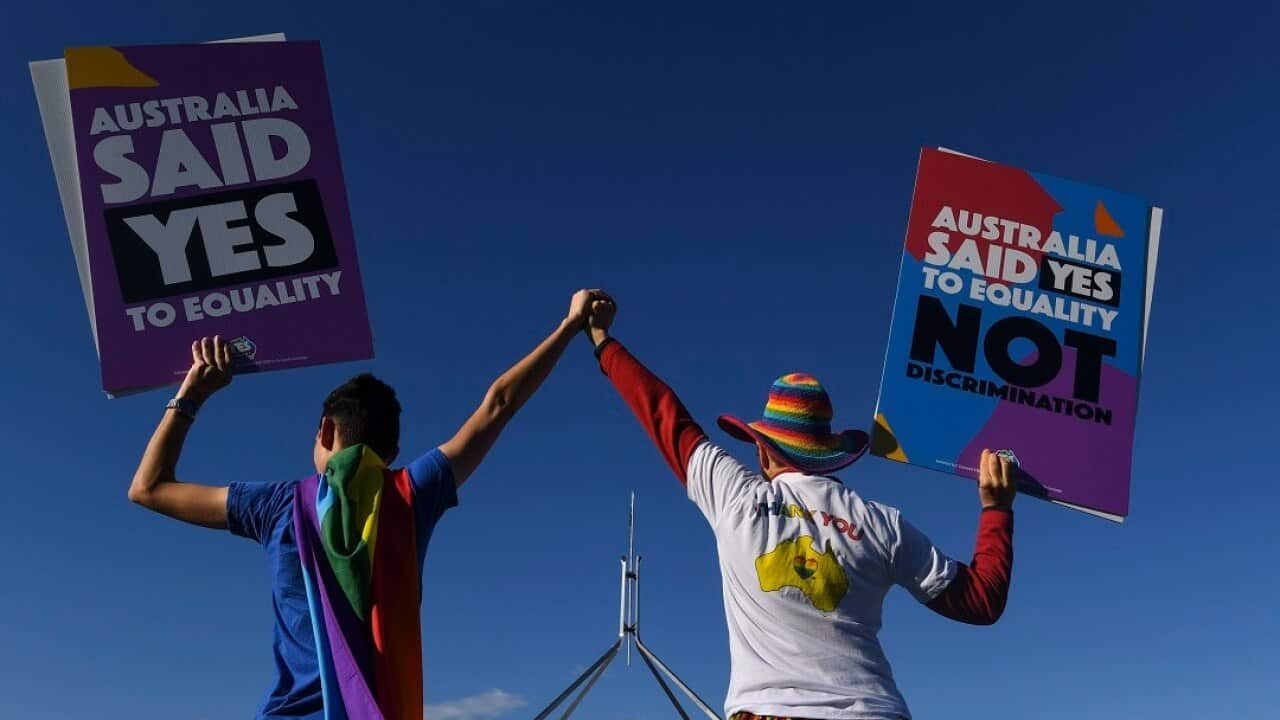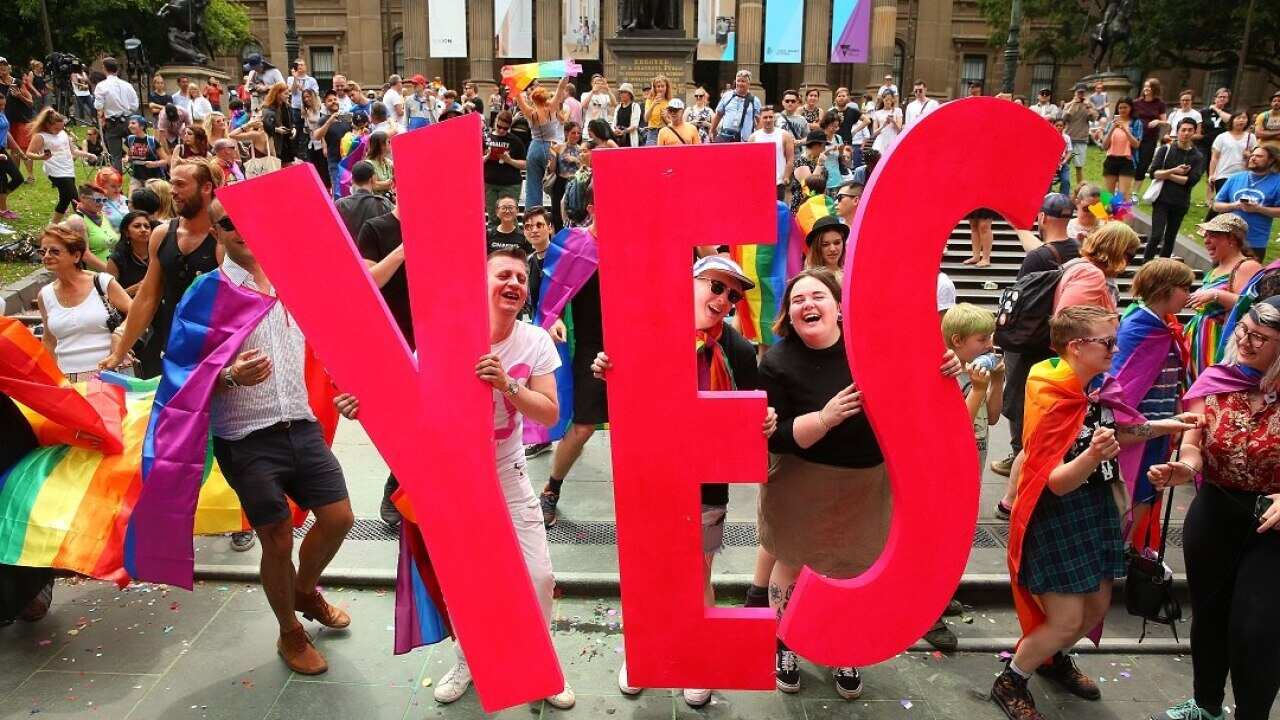OPINION
In the year that has come and gone since the marriage equality postal survey, so much has changed. I’m engaged to my co-worker’s greyhound Byron. Fissures have literally formed in the ground and have begun swallowing entire suburbs whole. Society as we know it has crumbled before our eyes.
Oh wait, no it hasn’t. If anything, we’ve all carried on, business as usual.
It’s hard to believe it’s been an entire year since the marriage equality campaign came to a close. If I’m being honest, reflecting on this part of our history and on my experiences living through it, is not a particularly pleasant experience. And after attending an (admittedly gorgeous) queer wedding a few weeks ago, it doesn’t necessarily feel like we won anything. Ask me again in a few weeks, a few days or a few years, and perhaps my answer will be different. The weddings are lovely. The open expressions of queer love are beautiful. But it’s hard to find the joy in it all when so much of the world around us is still hard for LGBTIQA+ communities.
Yes, we have marriage equality, but the fight is not over.
I’d like to tell you all a story. It’s a story about Tahnee and Jeddah. They’ve been together for 14 years and have a beautiful son – Banjo. Banjo is eight, and one of the sharpest eight year olds I’ve ever met. And he absolutely adores his two mums, which is just how I loved my big queer family too. I met Tahnee, Jeddah and Banjo while out in Yorta Yorta country for Blackfulla’s for Marriage Equality. And like so many of us following the announcement of the plebiscite – sorry, the voluntary, non-binding, non-compulsory postal survey - they were hurting and they were scared.
Tahnee and Jeddah had been married for seven years. Seven long, happy years until Jeddah made the choice to affirm her gender in the eyes of colonial law. Jeddah, with her family by her side, jumped through every humiliating and dehumanising hurdle to make this happen. But that final hoop? The one that meant that Jeddah could finally reach that goal that she had worked so hard towards? Our sista girl and her wife of seven years had to get a divorce. Their story is not an uncommon one. And it’s yet another layer outlining how discriminatory our marriage act truly is. Because it’s not just about that piece of paper or institution and it never has been. The law has power over our lives. Seven years gone because of some archaic notion of what gender and family should be.
I’ve spoken to them a lot in this past year- especially young Banjo. Honestly, that kid’s resilience is astounding. “I like that my mums can get married again now. I really like big parties, especially when they’re for two people that love each other," he says. "But I still get sad a whole lot because people don’t like my mums. People said that when we got gay marriage that everyone would be accepted, but it doesn’t feel like it”.
“I like that my mums can get married again now. I really like big parties, especially when they’re for two people that love each other," he says. "But I still get sad a whole lot because people don’t like my mums. People said that when we got gay marriage that everyone would be accepted, but it doesn’t feel like it”.

Shepherd was behind grassroots organisation Blackfullas for Marriage Equality. Source: Supplied
And from the mouths of babes, doesn’t that just say it all?
Nearly a full year on, the community and allies who mobilised in huge numbers for the marriage equality have remained largely silent around the ongoing barrage against trans and gender diverse folks, the continued attacks on the Safe Schools Coalition, and rumblings about gay conversion therapy on both State and Federal levels. LGBTIQA+ communities on this continent still experience structural inequities and violence, discrimination, and social and economic exclusion.
Yes, we have marriage equality now. But all you have to do is look at the rhetoric of the ‘No’ side to know that this campaign was never truly about the act or institution of marriage at all. It was about the validity of queer existence – the way we form our families, the way we raise our children, the way we show our love and the way we express our gender.
So no, we haven’t won the campaign yet. Yes, the law has changed to allow any two consenting adults to be wed. States and Territories have until December 9 to remove any legislation which forces trans folk to get divorced in order to affirm their gender on birth certificates and other legal documentation. However, we are not treated as equal yet.
Our business is not yet done, and the fight is not over. It won’t be until we are all equal and free. It’s time to pick up where we left off and lift up those who were trampled on in our pursuit for the right to wed – particularly the trans and gender diverse members of our communities.
But I have hope. Because I know what we can do now. I know that when we come together, we can be a powerful collective with a strong drive and purpose. Solidarity is our power, and although what we endured was painful, our resilience is phenomenal.
It’s time to show that same collective will once more, because we deserve more than just marriage equality.
Edie Shepherd was a key campaigner for the Yes vote in the marriage equality postal vote. The campaign features in Australia Says Yes airing on SBS on Thursday, November 15 at 7:30pm.








